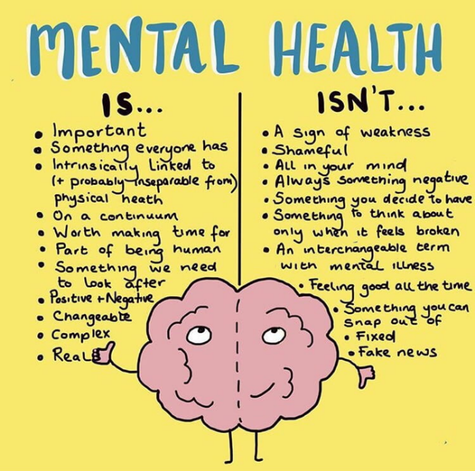|
Blog Author: Elizabeth Mount, Intern Counselor May is Mental Health Awareness Month. So, what exactly is mental health? The Center for Disease Control and Prevention (CDC) describes mental health as an “emotional, psychological, and social well-being. It affects how we think, feel, and act. It also helps determine how we handle stress, relate to others, and make healthy choices.”
Physical health and mental health are both important in achieving overall health. When one component is lacking, it affects all others. Think about physical health for a moment, when someone is suffering from phenomena or a broken leg, the natural step is to go to the doctor and take care of it. Take the broken leg example; get a cast, walk with crutches, take time to rest, and extra care to not put excess weight or pressure while the leg is healing. Now let’s take a moment to think about mental health. Let’s use anxiety as an example. When someone is experiencing increased anxiety, the first step should be to implement things to alleviate this anxiety. This can include seeing a mental health counselor, medication, using coping skills, and taking time to recharge. However, since mental health still has a stigma attached, this if often not the case. It is common to keep going instead of taking the time to treat this anxiety the same way we would the broken leg. When this happens, the anxiety can increase and become a bigger stressor which leads to even more symptoms and burnout. Mental health needs the same attention to heal as the broken leg. When mental health is impacted; it affects our physical health, relationships, job/school performance, self-esteem, and overall well-being. So, what can be done to help mental health? First be aware of the signs to look out for: such as increased stress, anxiety, decreased mood, changes in eating or sleeping habits, irritability, change in life events. Then take the proper steps to start feeling better. Physical exercise, healthy diet, sleep hygiene, medication, clean home and workspace, enjoyment, and leisure activities all play an important role. Be honest with yourself and know it’s ok to not feel ok all the time. Mental health is a lifelong process that ebbs and flows. The more we are open and honest about our struggles, the easier it becomes to talk about, and community is created where we see we are not alone in our experiences. Let’s start treating our mental health the same we would any physical health condition. Resources: https://www.cdc.gov/mentalhealth/learn/index.htm
0 Comments
Your comment will be posted after it is approved.
Leave a Reply. |
Archives
March 2024
|
